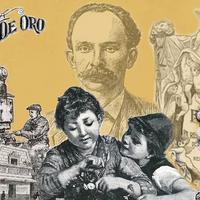La última página
Die letzte Seite
The last page
La dernière page
最後のページ
마지막 페이지
Ostatnia strona
A última página
Последняя страница
Den sista sidan
Остання сторінка
最後一頁
Este es el número de La Edad de Oro , donde se ve lo viejo y lo nuevo del mundo, y se aprende cómo las cosas de guerra y de muerte no son tan bellas como las de trabajar: ¡a saber si el tiempo del Padre las Casas era mejor que el de la Exposición de París!
This is the number of The Golden Age, where you see the old and the new of the world, and you learn how the things of war and death are not as beautiful as those of working: to know if the Father's time Casas was better than the one at the Paris Exhibition!
¿Y quién es mejor: Masicas, o Pilar?
And who is better: Masicas, or Pilar?
Sólo que en todo lo de esta vida hay siempre un desventurado.
Only in everything in this life there is always a hapless.
Y el desventurado de La Edad de Oro es el artículo sobre la Historia de la Cuchara , el Tenedor y el Cuchillo , que en cada número se anuncia muy orondo, como si fuera una maravilla, y luego sucede que no queda lugar para él.
And the hapless one of the Golden Age is the article on the History of the Spoon, the Fork and the Knife, that in each number announces itself very orondo, as if it were a marvel, and then it happens that there is no place for him.
Lo que le está muy bien empleado, por pedante, y por andarse anunciando así.
Which is very well used, for pedantic, and for being announced like that.
Las cosas buenas se deben hacer sin llamar al universo para que lo vea a uno pasar.
Good things must be done without calling the universe to see it happen.
Se es bueno porque sí; y porque allá adentro se siente como un gusto cuando se ha hecho un bien, o se ha dicho algo útil a los demás.
It is good because yes; and because in there it feels like a pleasure when a good has been done, or something useful has been said to others.
Eso es mejor que ser príncipe: ser útil.
That's better than being a prince: being useful.
Los niños debían echarse a llorar, cuando ha pasado el día sin que aprendan algo nuevo, sin que sirvan de algo.
The children should burst into tears, when the day has passed without them learning something new, without it being useful.
¡Quién sabe si sirve, quién sabe, el artículo de la Exposición de París!
Who knows if it serves, who knows, the article of the Paris Exposition!
Pero va a suceder como con la Exposición, que de grande que es no se la puede ver, toda, y la primera vez se sale de allí como con chispas y joyas en la cabeza, pero luego se ve más despacio, y cada hermosura va apareciendo entera y clara entre las otras.
But it's going to happen as with the Exposition, which is so big that you can not see it all, and the first time you leave it with sparks and jewels on your head, but then you look more slowly, and each beauty goes appearing whole and clear among the others.
Hay que leerlo dos veces: y leer luego cada párrafo suelto: lo que hay que leer, sobre todo, con mucho cuidado, es lo de los pabellones de nuestra América.
You have to read it twice: and then read every single paragraph: what you have to read, above all, with great care, is about the pavilions of our America.
Una pena, tiene La Edad de Oro ; y es que no pudo encontrar lámina del pabellón del Ecuador.
A pity, it has The Golden Age; and it is that it could not find sheet of the flag of Ecuador.
¡Está triste la mesa cuando falta uno de los hermanos!
The table is sad when one of the brothers is missing!

